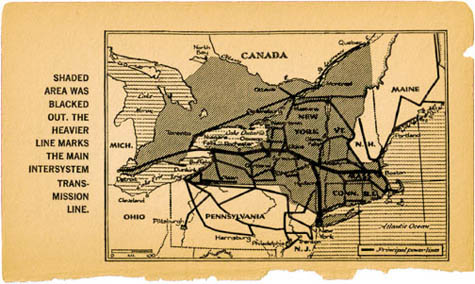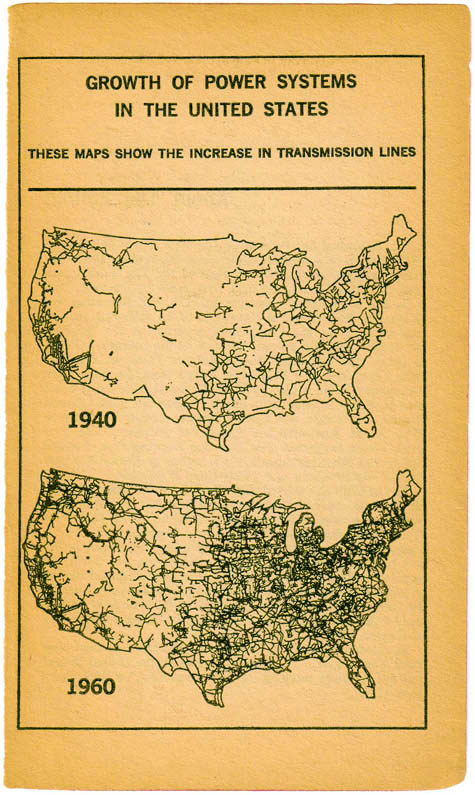 [Image: From The Night the Lights Went Out by the staff of the New York Times].
[Image: From The Night the Lights Went Out by the staff of the New York Times].
I’ll be leading a research seminar at the Pratt Institute’s School of Architecture this coming spring. I’ve decided to post the general course description here, simply because I think it might be of interest; I’m really looking forward to exploring this more in the spring.
In this guided research seminar we will look at blackouts—the total loss of electrical power and its impact on the built environment. From the blackouts of NYC in 1965 and 1977 to the complete blackout of the northeast in August 2003; from the “rolling blackouts” of Enron-era California to the flickering electrical supplies of developing economies; from terrorist attacks on physical infrastructure to aerial bombing campaigns in Iraq and beyond; loss of power affects millions of people, urban and rural, worldwide.
 [Image: From The Night the Lights Went Out by the staff of the New York Times].
[Image: From The Night the Lights Went Out by the staff of the New York Times].
But how do blackouts also affect the form, function, social experience, and even ecology of the city? What do blackouts do to infrastructure—from hospitals to police and traffic systems—as well as to the cultural lives of a city’s residents? While blackouts can lead to a surge in crime and looting, they can also catalyze informal concerts, sleep-outs, and neighborhood festivities. Further, how do such things as “dark sky” regulations transform what we know as nighttime in the city—and how does the temporary disappearance of electrical light change the city for species other than humans? This raises a final point: before electricity, cities at night presented a fundamentally different spatio-cultural experience. That is, the pre-industrial night was always blacked-out (something to consider when we read that, according to the International Energy Agency, nearly 25% of the global human population currently lacks access to electricity).
We will look at multiple examples of blackouts—internationally and throughout history—exploring what caused them, what impacts they had, and what spatial opportunities exist for architects in a blacked-out city. On the one hand, we might ask: how do we make the city more resilient against future failures of electrical power? But, on the other: how might we take advantage of blackouts for a temporary re-programming of the city?
This sounds great, would love to see a syllabus or reading list…Are you intending to address the current "smart grid" discussions in politics and how they might affect urban infrastructure (if at all)?
Wonderful Timing:
Just last night a 'world cafe' was hosted to discuss the potential implications of a worldwide blackout: there are no signs of its return.
Living in a rural/ecovillage/permaculture setting (panyaproject.org) posed dramatically different thoughts and concerns, compared to those given in your post focused on the city.
Again, thanks again Geoff.
suggested reading:
Jane Bennett,
The Agency of Assemblages and the North American Blackout
Public Culture 2005 17: 445-466
During the 2003 blackout in Toronto I had the interesting experience of being a pedestrian who "stepped in" to act as a traffic signal at a 6-lane intersection during rush hour. The sense of relief everyone in cars had for the "order" that was restored by the human-in-the-circuit was very palpable.
The other, almost McLuhanesque, experiences or changes in perception and action brought about in the absence of electricity were equally fascinating. Can you simulate a blackout as part of your class?
2008 Summer School at Architectural Association crossed over to blackouts and a world without electricity while exploring a post-catastrophic world. Take a look: http://catastrophicsilence.tumblr.com/
Sounds awesome!
I'd suggest you read pieces of David Nye's "Electrifying America" and/or his "American Technological Sublime." Both testify to the psychological effects that electricity had on Americans… And he touches on all kinds of detail about the deployment of the technological networks that bring lighting to cities.
He would also remind us that cities had lights before electricity powered by gas (natural or manufactured from coal). These technologies were competing before electricity became the universal energy carrier, which could provide light, heat, and power.
And last, I'd look into the Middle Western cities of the mid-19th century (Cincinnati, say) and what they thought about societal hygiene effect of lighting their cities. No more robbers hiding in the dark, etc. It could be a nice beginning of a discussion on the effect of light on crime in the urban context.
So happy for you, G, and I look forward to hearing what you and your students come up with.
it sound interesting
I will like to hear its…
I am working on a concept for an organisation that organises 'powerless activities' in the city (in the Netherlands) Creating social energy by not using electricity. I'm very curious about your project. Especially how blackouts …can also catalyze informal concerts, sleep-outs, and neighborhood festivities…
What about organised blackouts?
Very interesting. I design Science Labs for major universities. The simple threat of lost power drives a large number of decisions in my projects. We often spend hundreds of hours discussing power failure scenarios, generators, UPS, etc. during design. I'd be interested in hearing the results of your investigation. Good luck. Jacob
Can't let this one go by without nodding to Gogol Bordello:
Suddenly there is more humor
And a party Tabor style
People ringing one another
"Yo man, how's your blackout?!"
Suddenly there is more music
Made with buckets in a park
Girls are dancing with a flashlights
I got only one guitar
And you see brothers and sisters
All engaged in sport of help
Making merry out of nothing
Like in refugee camp
sportsbabel said…
During the 2003 blackout in Toronto I had the interesting experience of being a pedestrian who "stepped in" to act as a traffic signal at a 6-lane intersection during rush hour.
I heard blackout in Canada due to solar storms that cause 80% of electricity lost there, and at 2012 the same thing due by solar storms will happen over the world.
From what I see so far blackout is understood as the (sudden) lack of electicity. That may indeed lead to sponteneous concerts etc. if the occurence is rare. In developing countries it is a maor nuisance. Perhaps you should also look also into 'on puropose' black outs such as those enforced during the German occupation of the Netherlands. The idea being that a total black out would distort the navigation of English bombers.
I was in Ontario cottage country during the blackout (to the left and down from where it says 'Canada' on the first map); we were only aware of the problem when we turned on the satellite tv and watched the news… For whatever reason the power to that area came directly from Quebec so we weren't on the same grid that went down.
It would be interesting to see the degree of dependency on electrical power. This might also give us an insight as to where we can use alternate energy other than electricity.
This is a very interesting subject! Any updates on how it went?
I am very interested and would be very pleased to see the results or even just a reading list of some kind would be very much appreciated!